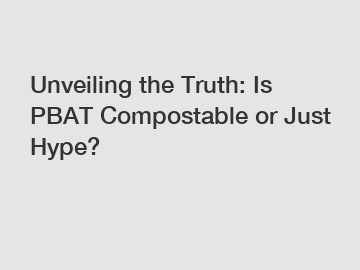Unveiling the Truth: Is PBAT Compostable or Just Hype?
Unveiling the Truth: Is PBAT Compostable or Just Hype?
In recent years, the term "compostable" has gained significant attention in the world of sustainable packaging. As consumers and businesses alike strive to reduce their environmental impact, compostable materials have emerged as an attractive alternative to traditional plastics. One material that has garnered considerable interest is PBAT (polybutyrate adipate terephthalate). However, amidst the hype surrounding PBAT, there remains a question: is it truly compostable, or is it just another greenwashing tactic? In this article, we will delve into the properties of PBAT and its compostability, shedding light on the truth behind its environmental claims.
Understanding PBAT: A Sought-after Biodegradable Plastic.

PBAT belongs to the family of biodegradable plastics known as aliphatic-aromatic copolyesters. It is a unique and versatile material that combines the properties of polyesters and polymers derived from renewable resources. PBAT's composition and its ability to break down naturally make it a popular choice among various industries, including packaging, agriculture, and cosmetics.
PBAT's Promised Compostability: Myth or Reality?
The compostability of PBAT largely depends on its ability to break down under specific conditions, resulting in organic matter. Contrary to popular belief, the compostability of PBAT is not universal and can vary based on several factors, including manufacturing techniques, additive composition, and intended disposal environment. PBAT, by itself, does not readily decompose in home composting systems or landfill conditions within a reasonable timeframe.
Secondary Heading: The Importance of Proper Disposal.
For PBAT to be compostable, it requires specific conditions to facilitate its decomposition process effectively. The key element is an industrial composting facility equipped with controlled temperature, humidity, and oxygen levels. In such an environment, PBAT can biodegrade within a few months, eventually turning into carbon dioxide, water, and biomass. Failure to dispose of PBAT in the appropriate composting facilities can result in a slower decomposition process or even the release of harmful microplastic particles into the environment.
Tackling Misconceptions: PBAT's Hurdles to Widespread Compostability.
While PBAT possesses the potential for compostability, several challenges hinder its widespread adoption. Firstly, the limited availability of industrial composting facilities restricts the practicality of composting PBAT-based products on a large scale. Additionally, consumers' lack of awareness regarding the specific disposal requirements for PBAT can lead to mismanagement and improper disposal, negating its environmental benefits.
Closing Thoughts: Separating Fact from Fiction with PBAT Compostability.
In conclusion, PBAT holds promise as a compostable material within the right conditions. To ensure that PBAT lives up to its compostability claims, it is crucial to educate consumers and businesses about the proper disposal methods, emphasizing the necessity of industrial composting facilities. Expanded access to these facilities, in turn, can drive the demand for compostable products and pave the way for more sustainable packaging alternatives. By understanding the truth behind PBAT's compostability, we can make informed choices, contributing to a cleaner and greener future.
If you have any questions or would like more information about the compostability of PBAT or sustainable packaging in general, please do not hesitate to contact us.
If you are looking for more details, kindly visit what is pbat, biodegradable starch resin, biodegradable resin suppliers.

Comments